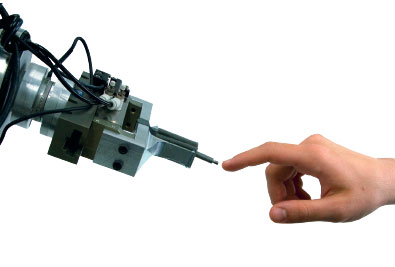
Robohub.org
Academic and industry collaboration (Part 1): Interview with Rodney Brooks

This is the first in a four-part interview series about collaboration between academia and industry, conducted by a group of scientists from the ECHORD project at Technische Universität München. Well-known and established experts in the field of robotics were asked: How can one connect industry and academia effectively? What obstacles are there and what makes collaborations effective?
The first expert is Rodney Brooks, who was interviewed by myself in Eskilstuna during the Robotics Innovation Challenge 2012. Brooks is professor emeritus at MIT and a successful robotics entrepreneur who just recently launched Rethink Robotics’ Baxter.
[Florian Röhrbein]
What are future research fields in robotics that should be worked in collaborative effort by both academia and industry? Are there specific fields where you think they are especially suited for this sort of collaboration?
[Rodney Brooks]
In general I think there can be collaborations across all fields as long as the expectations are right on both sides. Academia should only be involved if you are not too close to the product. In terms of technical readiness level it would be a 6 or even less. By the time it gets to 6 I think academics have lost interest.
Also the different reward systems of universities and companies seem to be a problem.
Yes, but you can also view this as a strength! With different reward systems innovations are different in the two places and you get the best from both. You cannot view either as a subset of the other.
Are there platforms or tools developed by companies that should be used more in academic robotics research?
It is interesting that ROS, the robot operating system, is now pervasive. One of the systems out of my lab, YARP, started to get used by the RobotCub people. But now ROS has taken over. In ROS you get a lot of tools that then become accessible and can easily be moved around – for example kinematic or dynamic tools. I think it is not so much ROS itself that has become important, but rather that there is now a place people can use as a repository, so that those tools start to become more universal. I think it is like how Open GL made graphics much easier … The same sort of thing is happening with robots.
Looking at this topic the other way round: are there emerging topics that you feel researchers should focus more on in order to ease future collaborations with industry partners?
I think that in industrial robots, and manufacturing in general, we have not really seen the impact of information technology in the same way we have seen it in the office and information spaces. It has been very slow to be adopted. When information technology or computation is brought into manufacturing, it is brought in like it was with mainframes. Imagine, if you had to program in COBOL in order to use this device – it would be useless! But I think that is the level where we are with trying to bring new technologies to manufacturing: right now it is all about how to achieve them and not about making them simple to use. It is the simplicity of use that leads to a high rate of adoption, and I think we have not seen that penetration yet. And this involves both industry and academia. These things have to be people-centric. Adapt them to people, not the other way around. This is where the big payoff is going to be.
Which routes of knowledge transfer do you consider most efficient?
I think the only way it can happen is by exchange of personnel, by people moving back and forth. I ran the Computer Science and AI lab at MIT with 839 people involved. We had a lot of collaborations with large and small companies, but it was only satisfying and successful when people really knew people in the other organization and moved back and forth. Academics were spending time at the companies and vice versa … several months, sometimes a year at a time. The companies and the academics have to be willing to make that investment. But no one wants to make that big an investment if there is no payoff!
What else would you consider a best practice for facilitating this cooperation between industry and academia?
In my experience, the most successful cooperations were those where we set up a joint lab. We did that with Nokia, Quanta Computer from Taiwan and with NTT from Japan. In each case, people from the company and from the university are equals, on all aspects. It is not “We’re the people with the money, we pay you”, or “We’re the people with the ideas”.
What do you think are the main obstacles in collaborative projects between academia and industry and what would be the means to overcome them?
Here’s a generic problem that I’ve see happen many times: The CEO of the company says “I want to bring innovation into my company by working with academia”, goes and signs a deal with some academic group, and then the CEO hands it down two levels in the company. And now it’s someone’s assignment: “Oh, I’m supposed to get innovation from …”
[interrupts] And then it doesn’t work anymore.
It doesn’t work at all. You’ve got to have someone who really understands what is wanted and is part of their mission and not get it handed off to people … they have to cultivate some group that is really going to do it. Within the company, the CEO says “Yes we’re gonna do this.”
Is this somehow collated with the size of the company? It might be easier for small companies because there are not as many levels involved.
Even in a small 50-person company I have seen it not quite working. Surprisingly, one very large company where I have seen it work very well recently is John Deere. The former CEO, Bob Lane, and the current CEO, Sam Allen, keep pushing it, and keep showing up at the places. And everyone in the company sees that this is important, that they really mean it. The CEO has to mean it by participating at some level. So they are running along to demonstrate they are on board.
Regarding upcoming research trends and robotic applications, do you think there are differences between North America, Europe and Asia?
The most important thing is cross-disciplinarity. I think Japan has a large failure on that, because robotics tends to be in mechanical engineering departments. These departments are so strong in academia that they do not have computer scientists or electrical engineers working on robotics, but only mechanical engineers. In my experience, places where the boundaries between the departments are much more flexible do better – for example with a lab structure across multiple departments. The differences are not necessarily by country, but also by institution. Some are too department-driven and others, like MIT, have a strong lab culture. It really depends on the individual institutions.
Thank you very much for your time.
tags: academic/industry partnership, c-Industrial-Automation, collaboration, ECHORD Interview Series, interview, podcast, Rodney Brooks




